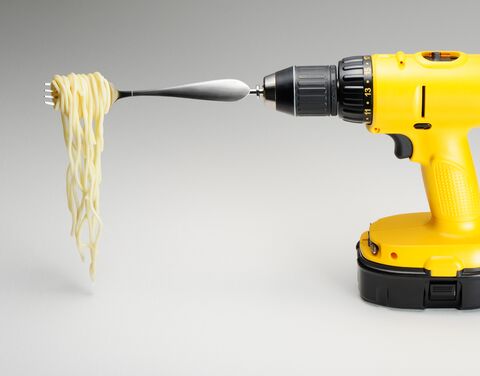
Patents: how do I protect my idea?
Most people in creative and scientific professions dream of inventing something entirely new, be it a brand logo, a fat-free chocolate or a drug to treat Alzheimer’s. But when does an idea actually belong to you?
I want to patent my Cro-bab, a cross between a croissant and a kebab. Julian Schenkel, what do I need to do?
Inventions that use technology to solve a specific problem can be patented. In other words, you can apply for a patent for your Cro-bab or the process used to make it if either solves a technical problem. The invention must also be novel, i.e. not obviously derived from the state of the art. If these conditions are met, you should investigate the areas in which the patent will be used and thus require protection.
When should I apply for a patent?
You can’t patent an invention that’s already become common general knowledge. You’ve got to apply within six months of your first publication. However, once you’ve published, there’s a risk that someone else might apply for a patent. This could lead to a lengthy lawsuit. As the inventor, you have the right to the patent, but it isn’t easy to prove you’re the inventor.
Do I need a lawyer?
If your invention is genuinely novel and doesn’t infringe any existing patents, you can apply for a patent. The description given in the patent application is vital because it defines the scope of protection. I would recommend consulting an expert to make sure there are no errors in your description.
What does a legal review of a patent application cost?
A search of the Swiss Federal Institute of Intellectual Property (IPI) records costs CHF 550, but this isn’t mandatory. Patent lawyers’ fees for research are negotiable and depend on the work involved.
You should definitely make every effort to verify that your idea is genuinely novel. You’d be surprised how many “new” inventions turn out not to be so new after all and actually infringe an existing patent.
I’m planning to run a food truck selling spätzli. How can I protect my idea against copycats?
You can’t really protect your idea as such. You can’t stop a rival from opening a spätzli food truck of their own, but you can protect your specific concept, for instance by trademarking the name. The Unfair Competition Act (UCA) also offers some protection against copycats. For example, no business that could potentially be mistaken for yours or has unnecessarily similar branding is allowed. In the event of a dispute, you would have to take the other party to court under the UCA, and that would give rise to legal costs.
How much does it cost to protect a trademark?
Trademark protection is limited to certain goods and services. If you’ve designated your spätzli truck as belonging to the “catering services” category, someone else could use the same name to sell unrelated services. The cost of registering a trademark in Switzerland depends on the number of goods and services it covers. The basic registration fee of CHF 550 includes three categories. Unfair competition claims aren’t covered by the register, you have to settle any disputes in court.
I sew clothes for children and want to open a little shop. Can I (or indeed do I have to) trademark the name “Little Sunshine”?
Before you register your trademark, you should clarify whether it’s already in use or easily confused with an existing brand. You can do this yourself by searching the registers, ask a lawyer to do it for you, or order a trademark search from the IPI.
Are there trademarks I can’t protect?
Symbols that are in the public domain, shapes that are characteristic of a product, and product or packaging shapes that are necessary for technical reasons can’t be protected. On top of this, your trademark must not be misleading, contrary to public policy or morality, or in breach of any law.
What does that mean in practice for my shop?
You can’t trademark “Clothes for Kids” because it’s a common phrase, but “Kägi’s Clothes for Kids” would be allowed. If an existing business is already using your name – or a very similar one – for the same type of product, its owner can object to your trademark. You can do the same if a copycat tries to register a trademark that’s too close to yours.
What happens if I don’t register my trademark?
If the trademark isn’t registered, rival businesses can’t be prevented from copying it or using similar branding. That said, the UCA and, under certain circumstances, the law on company names do offer some protection.
Can I protect my website’s domain name?
There is no special protection for domains. Generally speaking, whoever applies for a previously unused domain name first gets it, and identical domain names aren’t possible. However, a domain name could contain a protected trademark (e.g. “www.axa.ch”) or even be registered as a trademark itself (e.g. “search.ch”). The law on company names and the UCA also offer some protection for domain names. As a rule, domain names are considered too short to merit copyright protection in their own right.
I work as an industrial designer in a studio, and I’ve invented a new kind of coat hanger. Who’s entitled to the patent?
Inventions you create at work as part of your job belong to your employer. The employer is entitled to apply for a patent for your invention and benefit from the protection it offers. Unless otherwise agreed in your employment contract, you have no entitlement to any additional compensation.
Do I have to trademark my company’s name? What could happen if I don’t?
Your company’s name is entered in the Commercial Register. No one is allowed to copy it. However, others may use the same name for their products and trademark it themselves. If they do, this could restrict your scope for using your own company name for your products, so it’s advisable to trademark the name as well.









